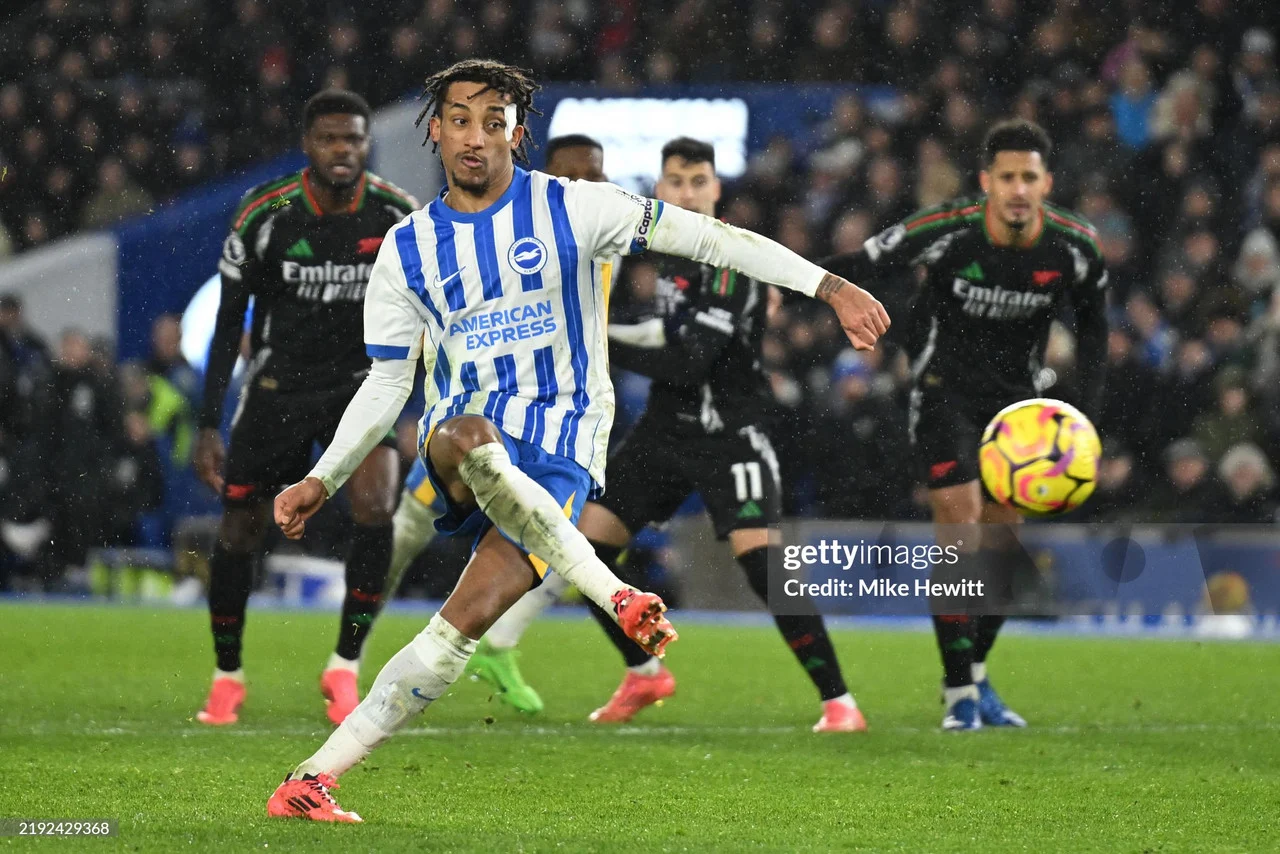Sports
Four Things We Learnt From Arsenal’s Draw With Brighton

|
Getting your Trinity Audio player ready...
|
Four things we learnt from Arsenal’s draw with Brighton
By Emmanuel Adeyemi-Abere
Arsenal allowed another blow to their title bid as they drew 1-1 with Brighton at the Amex Stadium.
The visitors went ahead in the 16th minute as Ethan Nwaneri netted his second Premier League goal on his second start for the side. But Brighton battled back at the start of the second half and after he clashed heads with William Saliba, João Pedro punished the Gunners from the penalty spot.
The Gunners never looked like reclaiming control of the contest after the equalizer. Brighton built up more confidence in the final half hour of a more open affair and the guests were grateful for Yankuba Minteh’s miss in the 77th minute as they left the south coast with just one point at the final whistle.
Here are four things we learnt from things we learned from Arsenal’s disappointing draw:
The boy is becoming a man
Last season, Arsenal only offered 13 minutes to teenagers in the Premier League. So, a surprise has been how Arteta has handed much more time to the cream of the crop from the Hale End academy.
Nwaneri has been one of the main beneficiaries of this change. Again, he filled in for the injured Bukayo Saka as the right winger. His goal was the most memorable aspect of his display on the evening as he took on the responsibility in the final third and looked assured with his finish.
Nwaneri did not have it all his way. He tended to try and beat Pervis Estupiñán on his inside and the fullback was prepared for that task. It is through these challenges that he will continue to mature.
However, he did not return to the field for the start of the second half due to a muscle injury. It is a reminder that Arteta must manage his minutes and safeguard his growth. However, the 17-year-old is finding his feet in senior football and should keep getting more chances to make a mark in the squad.
Partey’s positional problem rears its head again
Arteta attributed the loss of control in the second half to “dropping our standards and level with the ball, giving too many balls away.” However, the manager did not return an important element of the midfield to his usual role. And it is not the first time that he has faced this problem this season.
Thomas Partey excelled in the middle of the park at Brentford on New Year’s Day. However, he had to fill in as a right-back for this fixture because Jurriën Timber was serving a one-game suspension.
He watched on from the defence as Arsenal struggled to stitch sequences of passes together. Many of the players looked lethargic at this stage of the game and Partey probably would not have patched up everything on his own. But, the result reinforced a distinct difference that correlates with his position.
On average, Arsenal have picked up 2.2 points per Premier League match that Partey has started as a central midfielder. But across his five fixtures as a right-back, that average plummets to 1.3 points.
Arteta acknowledged he put players in positions that did not feel most natural or suit their strengths. He might not have much choice on this occasion but where possible, Partey should stay in midfield.
Avoiding set-piece stagnation
At the elite level, no good solution lasts forever and teams are trying out ways to stop the success of Arsenal’s set-pieces. Yesterday, the Seagulls showed a different approach to addressing this problem.
Similarly to Monaco in the Champions League, the hosts left a few players on the halfway line, so Arsenal could commit fewer bodies into the box from corners. They also put a pair of defenders on marking duties with Gabriel Magalhães and the defender did not have a single shot all evening.
There were still some big chances from set-pieces but the team must continue to come up with new ideas. Arsenal also love to take time with these routines, but must temper that tendency with wisdom.
Nwaneri received a booking on the verge of halftime because he took too much time to swing in a corner. A fortnight ago, it was Timber who earned a yellow card from a throw-in for timewasting.
Arteta agreed that the team can “certainly improve” their habits in these situations in his post-match press conference. It is one of a few places where this side can learn not to kill their own momentum.
Is the title gone for good?
All of these criticisms come back to one question: are Arsenal good enough to win the league title?
After 20 league fixtures, the Gunners have the same points tally (40) as they did at this point last season. But Liverpool are already five ahead at the top of the table and have two games in hand.
What is more concerning is how the team does not seem to have the same self-assurance of the past.
Arsenal only dropped points from a winning position on four occasions in the league last season. This stalemate was already the fifth time that the Gunners have sacrificed a lead and drawn this campaign.
Injuries and illness are also catching up with the squad far more severely than in the last two title races. Arteta needs to be able to rest his regulars and bring in fresh faces to manage the strains of the schedule, but again he had to call on his captain when he was well way away from full fitness.
Arteta’s men can only control what they do on the pitch but the problems are piling up. Nothing is out of the question but at the moment, it appears that the trophy will be heading to Merseyside in May.







